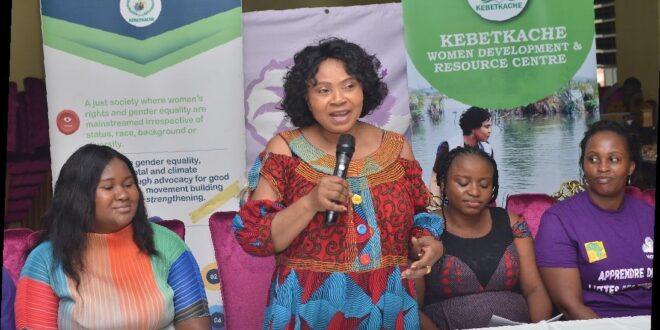… As Niger Delta Women Insist on ‘No Divestment without Ecosystem Restoration’
Up to 40% of the earth’s land area is at risk of degradation, directly impacting around half of the world’s people and putting half of the global economy (US$44 trillion) in jeopardy.
This is according to the United Nations Convention to Combat Desertification.
In Nigeria, 65% of the land is affected by degradation, with the Niger Delta ecosystem bearing the brunt of over seven decades of oil exploration activities.
If prompt action is not taken, droughts could affect over 75% of the world’s population by 2050, with Africa being particularly vulnerable, the UN report said, adding that since 2000, both the frequency and duration of droughts have increased by 29%.
These underscores the theme of the 2024 World Environment Day, ‘Our Land. Our Future,’ which highlights the issues of land restoration, desertification, and drought resilience.
While joining the globe to mark this year’s World Environment Day on Wednesday, non-governmental organisation, Kebetkache Women Development and Resource Centre noted that the yearly event “serves as a reminder that climate change and its impacts is affecting us all.”
In a release read in Port Harcourt, executive director of Kebetkache Women Development and Resource Centre, Dr Emem Okon, stressed that people around the globe “must continue to find sustainable ways to live, work and adapt in order to reduce biodiversity loss, pollution and protect our planet for future generations.”
She pointed out that in Nigeria, “65% of the land is affected by degradation – meaning it has lost some of its natural productivity. However, these lands still have environmental and economic value. Reviving and restoring these ecosystems is crucial in the battle against climate change.
“The UN warned that we must rewild and restore an area the size of China to meet commitments on nature and climate,” she said.
Dr Okon drew attention to the fact that Nigeria is impacted by “the silent, invisible crises of desertification, land degradation, and drought, which are mostly brought on by human activity and climate changes. Since many fundamental activities of human life depends on fertile and productive lands, stopping degradation or restoring degraded land through land restoration will be crucial to preserving biodiversity, restoring the ecosystem, and mitigating the effects of climate change.
“In addition to being the primary cause of climate change, oil and gas exploration and exploitation seriously harm the ecosystem. They contaminate the environment with heavy metals, and hazardous materials. They also cause environmental degradation. In such situations, they continue to be the primary cause of a variety of illnesses and disorders.
“Oil majors are departing the Niger Delta after more than 70 years of oil extraction and its terrible effects on oil-producing communities, particularly the women. Shell, the biggest international participant in Nigeria’s oil and gas industry and the one most responsible for years of rights violations and oil pollution, intends to sell all of its joint venture holdings in the country and take a “clean break from Niger Delta assets.” “Seplat Energy Plc, an independent oil and gas firm based in Nigeria, announced to the public in 2022 that it had purchased ExxonMobil’s Nigerian shallow water business.”
She said that as impacted Niger Delta women, “we are concerned about the swiftness of these divestment plans because the government has not provided any guidelines to resolve pollution issues brought against SPDC, AGIP, and Total Energies.
“The companies involved have failed to create women development funds to help victims of oil extraction. Women in the Niger Delta suffer severe environmental consequences of oil extraction. Decades of oil pollution and destitution have placed them in a vulnerable position, impeding subsistence agriculture and causing health complications.
“For the ecologically devastated communities of the Niger Delta, no hurried divestment by transnational oil companies will be tolerated without restoration of their environment and livelihoods. For them, the definition of just transition has to include repairing the damage occasioned by oil pollution, an audit of the health of the people, and a plan to respond to the threats posed by climate change.
“A just transition must also provide justice for the countless victims of oil company-inspired and state-sanctioned abuses and reparations to the people of the Niger Delta for decades of expropriation. Anything short of these is injustice.
“Land is essential to humankind. However, throughout the Niger Delta, a deadly cocktail of pollution, a chaotic climate, and the loss of biodiversity is converting productive regions into deserts and vibrant ecosystems into dead zones. They are destroying grasslands and woodlands, depleting the capacity of the land to sustain communities, agriculture, and ecosystems. By restoring ecosystems, we can slow the triple planetary crisis: the crisis of climate change, the crisis of nature and land loss, and the crisis of pollution and waste.
“As we mark the World Environment Day, using this global event day to call on governments, businesses, communities, and individuals to tackle the urgent environmental issue, to revive and restore damaged ecosystems across the globe in order to combat climate change, enhance biodiversity, and improve human well-being,” Dr Okon said.
 PH Mundial – Port Harcourt Online Newspaper News Across The Region
PH Mundial – Port Harcourt Online Newspaper News Across The Region





